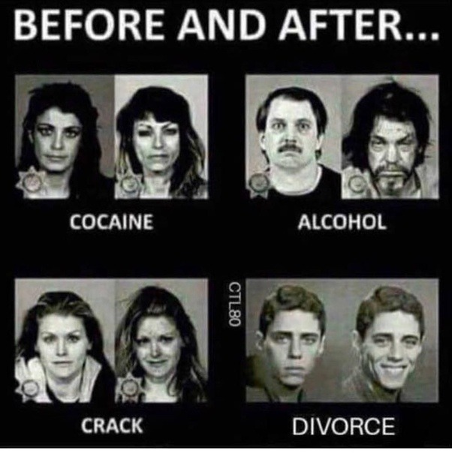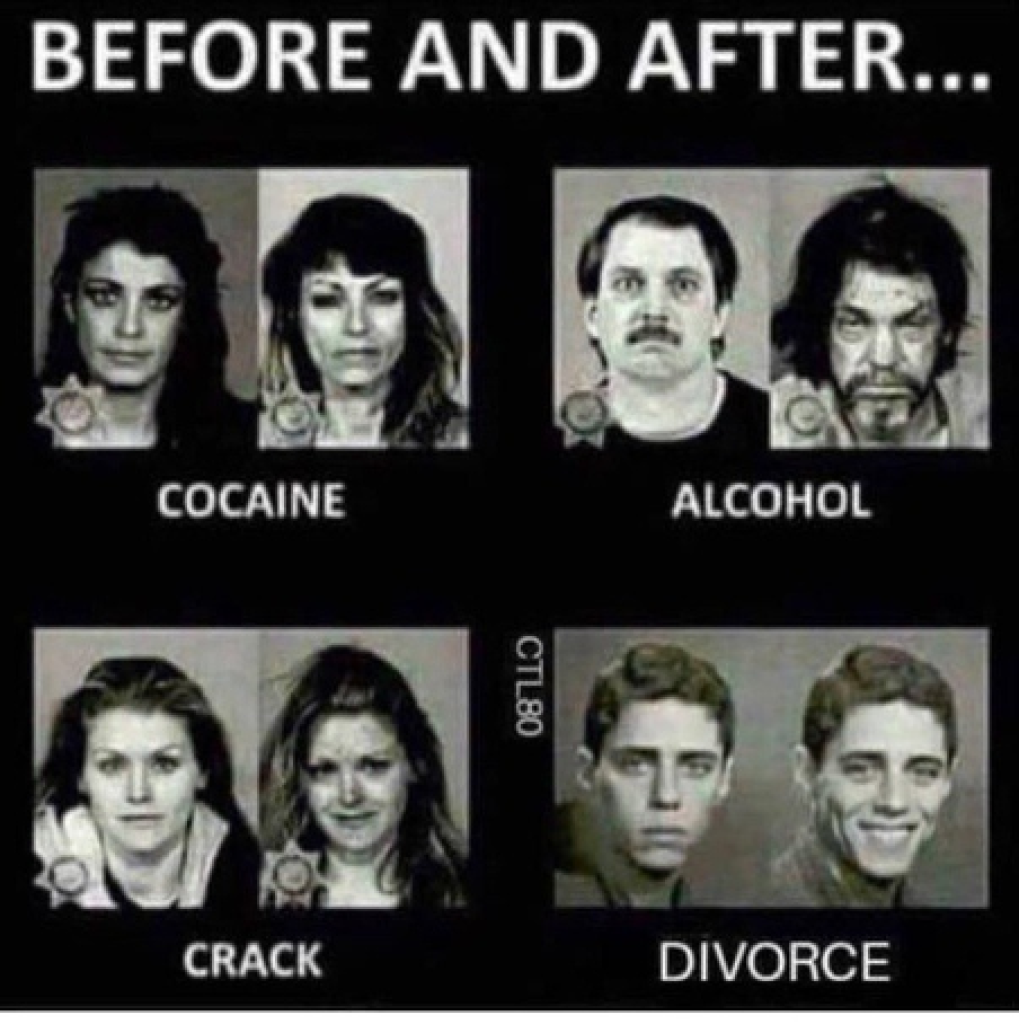

So, are you happier after a divorce? That is a very interesting question.
My Initial thought is heck yeah! But, all in all, is this really true? Is this true for most people?
I could easily see the reverse of this, and understand that many people experience a great sense of loss during these moments. Some experience both ups and downs during this time. The outcome of the divorce could bring joy or lead to devastation. Let’s look at both sides- happier or unhappier.
Not Happier After a Divorce?
Are you unhappy after a divorce? Per Psychology Today, Ann Gold Buscho Ph.D., in her article: Will You Be Happier After a Divorce?
- A study showed that unhappily married adults who divorced were no happier than unhappily married adults who stayed married.
- Divorce did not typically reduce symptoms of depression, raise self-esteem, or increase a sense of mastery.
- Divorce or separation is likely the best outcome in a destructive marriage.
Buscho says maybe it depends on who makes the decision, “If you are the one who decides to divorce, you probably believe that it will allow you to be happier. You envision a better time ahead. If you didn’t see the divorce coming, you are probably shocked, stricken, or angry and may dread the future.”
Again, the article points out that in fact, you may not be happier after divorce. “A 2002 study by University of Chicago sociologist Linda Waite found that, on average, unhappily married adults who divorced were no happier than unhappily married adults who stayed married.”
She noted though, that 81 percent of those who remarried were happier in their next marriage.
Divorce makes men feel devastated, confused, betrayed and even suicidal; while women are more likely to feel relieved, liberated and happy following a split, according to a report published in The Guardian.
This article points out that “More than two years after a divorce, 41% of men were still sad about the failure of their marriage; for women the figure was only 33%.”
Happier After a Divorce?
So are you Happier after a Divorce? According to GitNux blog, which presents Mental Health Statistics, in it posting on The Most Important Happiness After Divorce Statistics, updated in October 2023. These Statistics include:
- More than 50% of people reported feeling happier two years after their divorce.
- 79% of divorced people felt their life improved post-divorce.
- 52% of divorced men and women report increased self-esteem after their divorce.
- 57% of women said their finances improved after their divorce.
- 59% of people reported higher life satisfaction three years after their divorce.
- 77% of divorced respondents believe their heartbreak after their divorce helped them grow emotionally.
- About 74% of participants felt a sense of relief and liberation after their divorce.
It’s clear that it can go either way, Happier after a Divorce, or Unhappier after a Divorce, and the above is just a reporting of the facts from a summary perspective. Even if it is reported to be more positive, that may just be how it was reported and not necessarily the facts on the ground or in real life (IRL).
This set of statistics doesn’t clarify the ages, locations, races, education levels, or other demographics of the men and women in the study. So results could vary for your situation.
Even if 52% report increased self-esteem, and if taken at face value and the reported number was true, this means that 48% see a decrease in self-esteem.
As the author points out, “it demonstrates that it is possible to find joy and fulfillment even after a difficult period of transition,” so we cannot deny that divorce could also be a very positive experience for many.
Power Dynamics and Why the Marriage Failed?
These above statistics demonstrate that there are still plenty of opportunities for growth and personal fulfillment afterwards – even if you don’t immediately feel like it’s possible at first glance, although going through a divorce is never easy.
The need to continue to grow during a relationship impacts many relationships. So why do most marriages fail? Author Mathew Hussey believes that most marriages fail because we stop growing or stop growing together.
Not all people grow at equal rates and not all have the level of commitment necessary to grow together. This difference in dynamics may boil down to biology and the differences between men and women.
There seems to be evidence that unhappiness in marriage can boil down to a misunderstanding of the dynamics, or the changes in the dynamics between men and women. Some feel that feminism and women empowerment has altered the dynamic between the sexes. This may play a part, but it isn’t everything for sure.
Biology and Characteristics
We are evolutionarily shaped to be different. As men and women are difference. We do overlap in capabilities and actions, but we must recognize that there are key differences that do affect how we see one another and that impacts our perspectives.
Each gender brings something to the party. A marriage is a balance of masculine and feminine if you will. Not all are equal or the same, as some men are more masculine and some more feminine, and the same goes for women. Men and women think very differently and most don’t know how to interpret the other gender.
There are some basic gender differences which exist between men and women. In general, men are more logical, analytical, rational. Women are more intuitive, holistic, creative, and integrative. Men tend to be more functional in approaching problem-solving; women are aesthetically-oriented and to being functional.
According to the Relationship Institute there are many distinct differences. Of course, these are generalizations and the summaries that apply to most men or women, these include:
PHYSIOLOGICAL DIFFERENCES
- Girls develop the right side of brain faster than boys: leads to talking, vocabulary, pronunciation, reading earlier, better memory.
- Boys develop the left side of their brain faster than girls: providing visual-spatial-logical skills, perceptual skills, better at math, problem solving, building and figuring out puzzles.
- Girls are more interested in toys with faces than boys are; they play with stuffed animals and dolls more; while boys are drawn to blocks or anything that can be manipulated.
MEN
- A man’s sense of self is defined through his ability to achieve results, through success and accomplishment. He wants to achieve goals and prove his competence, though this he feels good about himself.
- For men, doing things by themselves is a symbol of efficiency, power and competence.
- In general, men are more interested in objects and things, rather than people and feelings.
- Men rarely talk about their problems unless they are seeking “expert” advice; asking for help when you can do something yourself, is felt as a sign of weakness.
- Men are more aggressive than women; more combative and territorial.
- Men’s self-esteem is more career-related.
- Men feel devastated by failure and financial setbacks; they tend to obsess about money much more than women.
- Men have a much more difficult time relating to their own feelings, and may feel very threatened by the expression of feelings in their presence. This may cause them to react by withdrawing or attempting to control the situation through a display of control and/or power. Maybe even humor.
- Men are actually more vulnerable and dependent on relationships than women are, and are more devastated by the ending, since they have fewer friends and sources of emotional support.
- Men are much more at ease with their own angry feelings than women are.
WOMEN:
- Women value love, communication, beauty and relationships.
- A woman’s sense of self is defined through feelings and the quality of their relationships. The spend much time supporting, nurturing or helping. They experience fulfillment through sharing and relating.
- Personal expression, in clothes and feelings, is very important.
- Communication is important. Talking, sharing and relating is how a woman feels good about herself.
- For women, offering help is not a sign of weakness but a sign of strength; it’s a sign of caring.
- Women are very concerned about issues relating to physical attractiveness; changes in this area can be as difficult for women. This is comparable to men in changes to his financial status.
- When men are preoccupied with work or money, women interpret it as rejection.
- Women are in touch with a much wider range of feelings than men, and the intensity of those feelings is usually much greater for women than men. Many men perceive that women’s feelings appear to change quickly; and find this irrational.
- Women tend to be much more sensitive to sounds and smells than men are; and women as such, tend to place a greater emphasis on “atmosphere”.
There are countless other differences like “women want empathy, yet men usually offer solutions.” So, it’s perfectly understandable that we don’t understand one another. Or, do we get what we want without asking for it directly? Communicating your desires, wants and needs plays a big part in relationship dynamics. Effort is required to keep up the relationship and to grow together.
It’s hard to predict if you would be happier after a divorce, or whether you would or have experienced the opposite. There may not even be a clear answer, as you might be happier in some ways and unhappier in others.
Some things may have worked out in your favor, but you are hurt in other ways. It’s okay that it is a mixed bag of emotions and feelings, as human beings we are never one thing. We are a mixed bag going into a relationship, during a relationship and after it.
I would like to point out that there are plenty of resources out there to help you get through this difficult time. We encourage people to seek professional help, and to communicate with others during and following a divorce.
It’s not weakness to talk to an expert. It can be very empowering to understand where you are emotionally, financially or otherwise, and to seek and chart a path forward for life 2.0.
In Conclusion:
There are also many potentially unanswered questions surrounding a divorce. If you are happier after a divorce or unhappier after a divorce are simple questions with complex and possibly a matrix of answers. Maybe you are better financially and worse emotionally, maybe the opposite or reverse is true.
But overall, hopefully you can find the positives in your new life as you journey through the emotional and life impacting experience of divorce.
It should be noted that there are many more consequences of divorce that we didn’t tackle today as well. These are the much harder questions. As Buscho point out in her Psychology Today article. “Should I have worked harder on the relationship? Did I give up too soon? Did I miss the cues from my spouse that she was unhappy?” “Has the divorce damaged my children?
All of these subjects are for another day and time…
******
Dating Refinery’s Blogs, Articles and Diaries are meant to reflect an individual’s experience and do not necessarily reflect Dating Refinery’s point of view. Dating Refinery in no way encourages illegal activity or harmful behavior.
We hope you enjoyed this episode!
The first step to getting your life in order might just be sharing your thoughts, feelings and experiences with us — to try on your own, check out our blogs and discovery sections. For more information and stories, click here.
Do you have a Dating Diary you’d like to share? Submit it with us here.
Do you have a Video you’d like to share? Submit it with us here.
Have questions about how to submit or our publishing process? Email us here.






